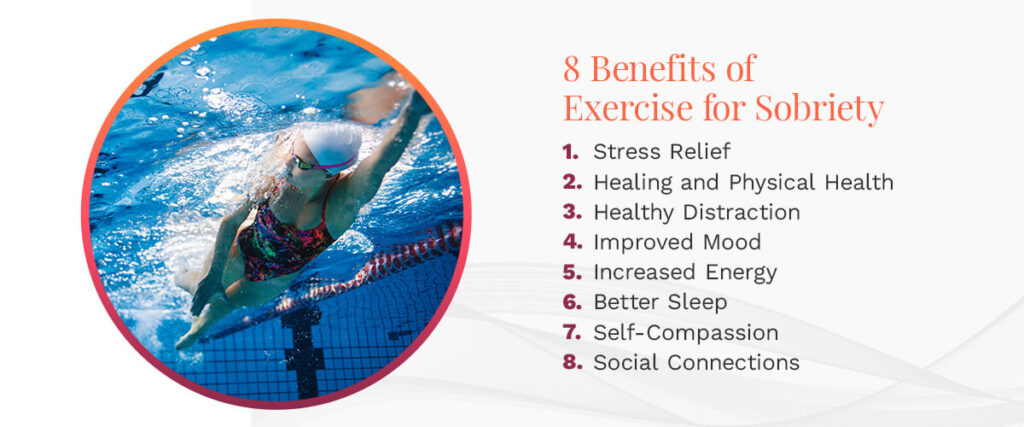How Exercise Can Help Your Sobriety
How Exercise Can Help Your Sobriety
Exercising does more than keep your body healthy. Exercise helps you recover from addiction to drugs or alcohol. Spending time exercising may reduce your cravings while improving your mental health, which can help enhance your quality of life. Participating in different types of exercise, such as cardio, stretching and strength training, can positively impact your life and recovery process, especially when combined with professional treatment from a compassionate addiction treatment center.
8 Benefits of Exercise for Sobriety
Pursuing and living a sober life is possible, especially with a healthy lifestyle and coping strategies. A consistent exercise routine has the following benefits for sobriety:
1. Stress Relief
Stress is a normal part of life, but too much stress can lead to physical and mental complications, including potential relapse. Exercise is one of the best ways to combat any stress you may feel from your personal life or due to your addiction. Moving your body helps release the endorphins in the brain, which helps your body balance stress hormones.
Low-intensity exercise or anaerobic exercise benefits your mind and body by combating stress. Going for a walk, running on a treadmill or completing a workout routine can help you manage stress and reduce your cravings when you encounter stressful situations or triggers.
2. Healing and Physical Health
Prolonged alcohol and drug use impact significant organs, but exercise can help promote healing for your body and make you feel better. Exercising regularly can protect your body from developing potential health risks, such as:
- Cardiovascular disease
- Type 2 diabetes
- Certain cancers
- Metabolic syndrome
Exercising can also help you improve your muscle and bone strength and slow the aging process, which will help you feel better during and after recovery. Taking care of your body allows you to accomplish more physical tasks easily and live an easier life than you would by avoiding exercise. Exercise also benefits your mental health by releasing serotonin, a chemical believed to act as a mood stabilizer. Those advantages can help your recovery journey, and you'll feel healthy, happy and eager to continue pursuing treatment.
3. Healthy Distraction
While recovering, it's essential to find activities that take your mind off cravings and triggers to sustain your recovery. Exercise is a great way to fill your day with healthy activities so you can focus on the positivity in your life. Establishing a routine filled with exercise benefits your mind and body. It gives you goals to work toward and opportunities to feel productive and accomplished, feelings that are beneficial in recovery.
4. Improved Mood
If you're struggling with a substance use disorder, you may use drugs or alcohol to deal with intense emotions or feelings, such as anxiety, depression or exhaustion. Exercising is a healthier way to break free from these negative emotions and releases neurotransmitters in the brain, which are chemicals produced in the brain that can make you feel happier and reduce your negative emotions.
Exercise and mental health are connected, so exercising can help you improve mental health symptoms that may contribute to substance use. Improving your mood is essential to help you progress through your recovery.
5. Increased Energy
Regular exercise can make you feel more energized and motivated throughout the day. This motivation can help encourage you to pursue addiction treatment, whether attending group meetings or individual therapy.
When you exercise, your heart pumps blood faster, increasing muscle nourishment and delivering more oxygen through the body. This strengthens your body and increases its ability to release energy.
6. Better Sleep
Getting enough sleep each night is essential to make you feel better throughout the day so you can perform at your highest level. Sleep is essential to help you maintain your physical and mental health, and exercise can help you sleep better. Exercising before you go to bed can make your body cool faster and help you fall asleep easier. Try to exercise an hour before bed, as working out right before trying to sleep can amp you up rather than wind you down.
Exercising also helps your body's natural healing process, which allows your body and mind to heal and regain strength while you sleep. Insomnia is a common symptom people experience when going through withdrawal, but exercise can help you get the sleep you need to aid your recovery.
7. Self-Compassion
Working out is kind to your body and teaches you to treat yourself with love, as long as you’re not overdoing it. Taking the first steps towards caring for your mind and body can help you participate in other types of self-care that can improve your overall life, such as focusing on positivity and setting and achieving goals.
8. Social Connections
Exercising with a group can help you recover from addiction, whether you participate in classes or visit a gym. You can connect with others who enjoy exercising, which can help you find a support network. The social benefits of exercise can help you feel more motivated to progress through your sobriety journey.
How Does Exercise Help With Addiction Recovery?
Exercise benefits your recovery for many reasons, especially since physical activity releases chemicals in your brain that is responsible for happiness. When these chemicals are released, it reduces stress and cravings. Training your brain to enjoy a natural amount of these chemicals can replace the cravings you experience from alcohol or drug withdrawal. You can improve your physical and mental health, which can help you handle the challenges you experience throughout recovery. How Exercise Can Help Your Sobriety.
Exercise releases various neurotransmitters that can help you create a healthy, natural high, including:
- Endorphins: Endorphins are the brain’s natural pain relievers that block pain, reduce stress and create feelings of pleasure and well-being. They are the chemicals the brain releases when someone eats delicious food, falls in love or has sex.
- Dopamine: Dopamine can invoke feelings of pleasure while regulating mood, heart rate, attention, motivation, sleep cycles, learning, pain processing and working memory. Substance use can eventually decrease dopamine in the brain, but exercise can replenish the brain’s dopamine supply and increase a person’s capacity to feel joy without substances.
- Serotonin: Serotonin can naturally stabilize your mood, create feelings of happiness and reduce feelings of anxiety and depression that may have led to substance use.
- Endocannabinoids: Endocannabinoids create a calm euphoric feeling following strenuous physical activity.
7 Types of Exercise for Recovering Individuals
When you’re adding exercise to your recovery plan, try to find activities you enjoy — that will make them more fun, and you can feel more motivated to exercise. It’s OK to try an activity a few times, decide it isn’t for you and move on to something else. If you are new to recovery or want to try some new activities to maintain your sobriety, consider these fun exercise options:
- Walking and hiking: Walking is good for your mental health and is a simple way to exercise daily. Even a short walk around the block or on the beach can improve your health and help you maintain a sober life. Hiking is a great way to walk while exploring nature, which can help take your mind off your cravings and give you time to reconnect with your environment.
- Running: Running is an excellent cardio exercise that releases endorphins and gets your heart pumping blood faster. Running can also be done in groups, which can help you form social connections essential to addiction recovery.
- Cycling: Cycling is also a great cardio exercise if you prefer wheels. Like running, you can cycle in groups to connect with those around you.
- Swimming: Swimming is a fantastic cardio exercise if you enjoy the water. Swim some laps in the pool or take a dip in the ocean to get your
endorphins flowing. - Team sports: Joining a team sport is an excellent way to get exercise while developing healthy relationships with others and gaining a support network.
- Muscle strengthening: Activities such as CrossFit routines, weight lifting, squats and push-ups combine resistance and repetitive motions to strengthen muscles, which improves your overall well-being so you can progress through treatment.
- Yoga and Pilates: Yoga and Pilates can increase flexibility, reduce stress, and improve balance with specific stretches targeting various body parts.
Pursue Recovery With Transformations by the Gulf
With a healthy lifestyle, you can pursue and maintain sobriety. Implementing a consistent exercise regimen into your routine can help reduce cravings and help you feel your best. But exercise isn’t the only way to pursue sobriety. Professional support and therapy services can also help you in recovery. Transformations by the Gulf offers holistic treatment to help individuals recover from substance use. How Exercise Can Help Your Sobriety.
When you stay in our spacious facilities near the beach, you can recover comfortably and enjoy plenty of exercise opportunities just a short walk away. Whether you do some push-ups in the sand or swim in the ocean, Transformations by the Gulf is an excellent place to pursue recovery and maintain your health. Contact us to learn more about how we can help you live a healthy, sober life. How Exercise Can Help Your Sobriety.
If you or someone you know would like to know more about Transformations by the Gulf Substance Abuse Treatment Center Give us a Call 24/7 (727)498-6498
The success of a person’s recovery depends on the level of personalized treatment provided. It is important to find an addiction treatment program that works. When we say our treatment is individualized, we mean that we craft a program that is tailored to address the client’s unique physical, mental and emotional needs.
In the client’s first 24 hours with us, we’ll evaluate their current state and work to understand what challenges they need to overcome. They’ll also have an initial session with our doctor and meet with one of our licensed mental health professionals. How Exercise Can Help Your Sobriety.
After the initial evaluations, we’ll design a treatment plan with the sole mission of helping the client overcome and heal from addiction. Their program will focus on things such as:
- Addressing and Identifying root causes of addiction.
- Creating a support system.
- Developing healthy stress management techniques.
- Eliminating Substance use.
- Learning how to communicate emotions effectively.
- Maintaining a healthier lifestyle.
- Repairing damaged relationships.
Our Facility is near the beach and offers a comfortable setting for substance abuse treatment and recovery.
What a Day is Like in Our Treatment Facility.
Why Transformations by the Gulf?
Ready to Quit? Here Are 5 Tips to Stay Sober - St. Pete Beach Addiction Recovery Center
Getting sober is an extremely difficult task. Off the bat, you have to deal with old behaviors, cravings, withdrawal, and friends that don't know you're clean.
Whatever your challenges were in the process, it's an impressive and important task that you've achieved. It's not all over yet, however.
Relapse is a reality for many people who have gotten clean a time or two. For whatever reason, people have a hard time when they're trying to stay sober. We're going to give you some of our best tips on how to stay sober when you're already clean.
How to Stay Sober
It's difficult to give blanket options that will help in all situations. Everyone is different and faces different struggles in their relationship with sobriety.
There are some tried and true things to keep in mind when you're staying sober, though. Here are some things we think will help:
1. Address the Underlying Issues
What do you think contributed most to your alcoholism in the first place? Was it a difficult family life, a rough crowd of friends, or trauma? Something else?
It's likely that you didn't become an alcoholic out of the blue; there are typically circumstances that lead to such destructive behavior, and you're liable to relive that behavior if you don't address those issues.
This might mean talking with specific people in your life, seeing a counselor, or something else that helps you come to peace.
2. Join Alcoholics Anonymous
AA is an organization that serves the strict purpose of helping individuals deal with their alcoholism in the healthiest ways possible. They've dealt with all kinds of people in all kinds of situations and have a vast understanding of how to talk about and deal with alcoholism.
You would be missing out greatly if you decided to avoid the group altogether. We highly recommend that you at least try to attend a meeting or two.
3. Establish a New Routine
The old places and people you used to spend time drinking with might not be the right people for you in this stage of life. It's a positive thing that you are moving forward and making healthy choices.
If people aren't willing to adjust their behavior to support your decisions, that's totally fine-- they aren't required to. Their lives are their own. However, you can't step backward just because they won't move forward.
4. Communicate Your Feelings
This can be a hard thing to do. At the same time, it's essential if you want to have the kind of support that you need.
Talking with your friends and family is essential in this entire process. These people should have a decent understanding of the struggles you're having with sobriety and be there to help you through them.
That way, if you're feeling a craving and your sponsor doesn't pick up, your friends and family will be there to catch you before you fall.
5. Actually Move Forward
Many people get sober and try to stay sober without making any real changes to their lives. Sure, you're sober, but you're still living the way you did when you were drinking.
Make advances in your personal life that are really impactful. Go to school, make new friends, find new interests, whatever you like. The point is, you wanted to get sober so you could have a better life-- get out there and make your life better.
Struggling With Alcoholism?
If you're having a hard time trying to stay sober, you're not alone. Many people don't get it their first try, but it's essential that you keep on moving.
We're here to help you on your journey. Contact us to find out more about how you can find treatment.



